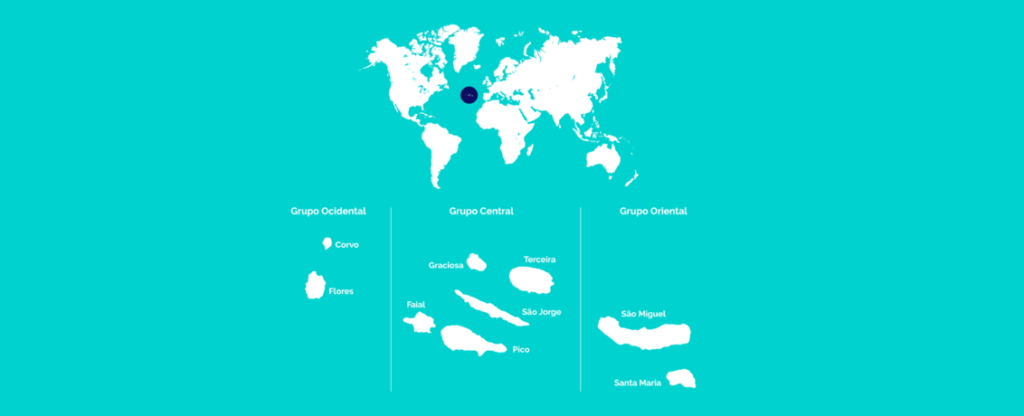The nine islands of the Azores archipelago are all of volcanic origin and are located in the middle of the North Atlantic, spread along a strip about 600 km long, from the island of Santa Maria to the island of Corvo, between 37° and 40° north latitude and 25° and 31° west longitude. There are 236 657 people (Census 2021-preleminary data) living on this island region that has an area of 2,325 km2 and which is 1,600 km away from the European mainland and 2,454 km from the North American mainland (Canada).
On a mythological level, some people claim to associate the Azores with Atlantis, the mythical island kingdom mentioned by Plato. On a historical level, since the mid-14th century, there have been allusions in books and maps to nine islands in approximately the same location in the Atlantic Ocean as to where the Azores are established to be nowadays. However, it was by way of the Portuguese epic seafaring expedition led by Prince Henry the Navigator that the Azores definitively came to be recorded on the map of Europe. It is not known whether it was Diogo de Silves in 1427 or Gonçalo Velho Cabral in 1431 who was the first navigator to reach the archipelago. The origin of the name the Azores is also the subject of several theories. The most widespread theory associates the name to the kites found flying around the islands, which, at the time, were confused with another bird of prey: the northern goshawk, or açor as it is known in Portuguese. What is certain however is that Prince Henry the Navigator instigated the process of humanisation of the islands with the introduction of animals, between 1431 and 1432, followed by settlers being sent from 1439 onwards.
From then on, settlement of the islands continued throughout the 15th (eastern and central groups of islands) and 16th (western group of islands) centuries. The people that came across from mainland Portugal were then joined by Jews and settlers from the Maghreb, Flanders, Genoa, England, France, and Africa to face the task of populating the islands.
This epic undertaking has shaped a people who, over the centuries, have withstood volcanic eruptions and earthquakes, isolation, pirate invasions, political wars, and rampant disease. Resistance to Spanish rule during the dynastic succession crisis of 1580 and support for the liberal cause during the civil war (1828-1834) are examples that demonstrate the courage of the Azorean people. Even in the 20th century, this bravery lived on in the epic whaling expeditions that were launched from the islands, in which men headed out into the immense blue expanse of the ocean in small wooden boats to come face to face with gigantic sperm whales.




